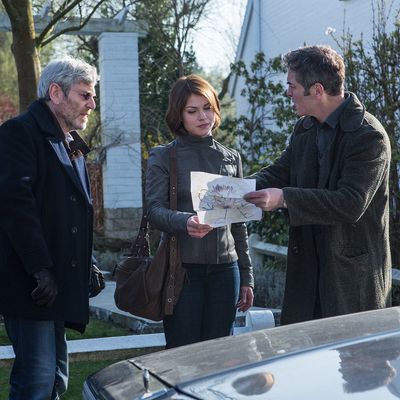
The Missing, a mystery woven around the abduction of a child, is eight exceptional hours of TV that I doubt I’ll ever want to watch again.
Written by Jack and Harry Williams (Roman’s Empire) and directed, à la True Detective, entirely by one filmmaker (Tom Shankland), this limited-run series, which premieres Saturday at 9 p.m., is mercilessly precise in its evocation of all the different possible responses to a traumatic event. Sometimes it’s so wrenching (because the emotions are so raw, and so honestly expressed) that I found myself listening to it like a radio program, head down, taking notes, so that I wouldn’t have to look at the characters’ agonized faces.
I have two kids, but I don’t think that’s the reason this series proved so hard for me; it probably has more to do with the generalized but deep notes of existential terror that it strikes, which I suspect will rattle pretty much anyone. Clear away The Missing’s specific plot details, and you’re looking at a story about what happens to people when tragedy swoops down without warning and smashes their lives. Every response to such an event falls along a continuum that starts with denial and ends with acceptance; all the fine gradations of response become clearer thanks to the series’ structure, which (like True Detective and countless time-fragmenting tales before it) flashes from past to present and back again, alternating how things were and how they are.
The trauma originates in the French town of Chalons du Bois, where, in 2006, Tony (James Nesbitt) and Emily (Frances O’Connor) go on vacation. France is on the verge of defeating Brazil in the World Cup finals. Everyone is buoyant. Tony and Emily and their 5-year-old son, Oliver (Oliver Hughes), are having a grand time. Then Oliver disappears at an outdoor pub where Tony has pushed up toward the bar TV to watch the concluding match.
But this is not where The Missing’s story begins: It starts in the same town circa 2014, with Tony, who has never given up his obsession with finding out what happened to his son, gets a bit of information that he thinks might solve the puzzle, and says as much to Emily (who’s back in England) via voice mail.
I’m reluctant to go into a lot more detail here, because The Missing is one of those rare series about which one can say that it’s better viewed in a state of blissful ignorance. I say this because the show’s structure and style are fused in such an exact way (every plot detail accounted for, every emotional effect carefully calibrated) that it matters very much what happens, when the event is unveiled, and who is learning about it or responding to it, what they are saying or doing in response, and what year the moment is taking place in. By which I mean: Everything in this series, down to the individual shot and line, contributes to the whole.
Also notable is The Missing’s almost heroic refusal to indicate that one response or another is “correct.” Tony’s Ahab-like obsession with discovering what happened seems unhealthy and self-defeating when you’re looking at him through the eyes of other characters, but when you’re just sort of following him around and he tries to gather up facts and put two and two together, you find yourself being drawn into his mania, and thinking: He’s not crazy, he’s an optimist, and all those people telling him to let it go just don’t have his stamina, don’t care about justice anymore, etc.
But it’s that way with almost every character in the series: Those whose eyes you happen to be looking through seem to reveal the world as it is, or ought to be, but only at that moment. When you first see Emily circa 2014 and realize just how much her circumstances have changed since 2006 — and what probably needed to happen in order to change them — you identify with her, and see Tony’s mission as one of denial transmogrified into distracting madness.
The series continues to do this as it unfolds, giving you the points of view of townspeople, public officials, friends and relatives of the leads, and characters who have joined the story in 2014 but didn’t know any of the key players eight years earlier. Amazingly, this multiplicity of viewpoints doesn’t fragment the show but seems to strengthen and deepen it.
And for all of its almost scientific attention to the granular details of shifting emotion and point of view, The Missing also has an eye for beauty. Every few minutes, there’ll be a shot or series of shots that are lovely in and of themselves, or that seem to express a profound love or sorrow that’s beyond words and perhaps beyond narrative: a car stalled at a crossroads, a father and his son floating in the deep blue water of a swimming pool, a woman’s finger dragging along a polished tabletop. This is one of the year’s very best TV programs, hard as it sometimes is to endure.





